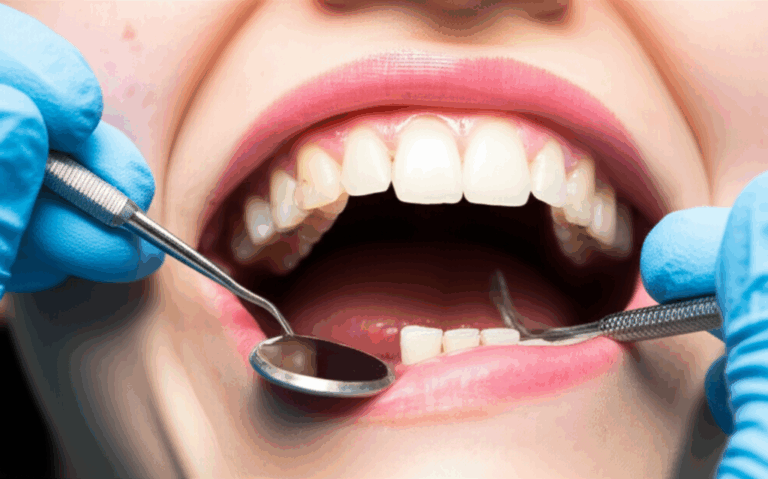
Can a Dentist Fix Sensitive Teeth? Your Guide to Professional Relief and Solutions
Do you feel a quick pain in your teeth when you drink hot cocoa or eat ice cream? Sensitive teeth can make simple joys turn into worries. In this article, I’ll show you what tooth sensitivity is, why it happens, and—most important—how a dentist can help you feel better. This is worth reading because you don’t have to suffer in silence, and the right dental care can help you enjoy eating and drinking again.
Table of Contents
1. Introduction: Tooth Sensitivity—Is There Real Hope?
Ever had sudden tooth pain stop you from finishing a meal? I have, and so have millions more. Sensitive teeth happen to about one in four grown-ups.
Here’s some good news: dentists can help. The road to pain-free eating starts with knowing why your teeth are sensitive and what can really help. So, is there hope? Yes! Let’s take a look.
2. What Makes Teeth Sensitive?
Tooth sensitivity, also called “dentin hypersensitivity,” happens when the inside part of your teeth (dentin) gets exposed. Dentin sits under your hard enamel, and connects straight to the nerves in your tooth. When cold, hot, sweet, or sour things touch those nerves, you feel pain.
Why does this happen?
- Enamel wearing down: Maybe from brushing too hard, eating a lot of sour or acidic foods (like soda or lemons), or acid reflux. Even vomiting often because of some health issues can wear away enamel.
- Gum recession: Your gums can pull back from gum disease, brushing too hard, or getting older. This opens up the roots of your teeth, which don’t have enamel.
- Dental problems: Cavities, cracks, or old dental work that is breaking down can cause nerve pain. Grinding your teeth (called bruxism) also wears teeth down.
- Side effects from dental care: Teeth can be sore after whitening or after getting a filling, but that pain usually goes away soon.
Common triggers:
- Hot, cold, sweet, or sour foods and drinks
- Cold air in winter
- Brushing your teeth
3. How Does a Dentist Diagnose Sensitive Teeth?
Many think sensitive teeth are just normal, but that’s not true. You can get help, and your dentist is the person to ask.
Here’s what happens when you see the dentist:
Full Exam
- The dentist checks your teeth and gums for signs like open dentin, gums that have pulled back, cavities, cracks, or thin enamel.
- If you mention pain that won’t go away, the dentist will listen and check carefully.
Dental X-rays
- X-rays show things you can’t see, like hidden decay or bone loss.
Sensitivity Tests
- Your dentist might use air, touch your teeth, or have you taste something cold to see where it hurts.
Talk It Out
- Your dentist will ask when the pain comes, how bad it is, and if foods make it worse.
Knowing the cause is the first big step to real relief.
4. Can Dentists Really Fix Sensitive Teeth?
Maybe you wonder: “Do I just have to live with this pain?” The easy answer is no. Dentists know how to find what’s causing your sensitive teeth and have ways to help.
Why do you need a dentist’s help?
- Some sensitivity only dentists can fix, like cavities, nerve problems, or gum loss.
- DIY tricks can be risky. What helps one person might hurt another, especially if you have a cracked tooth or gum disease.
With the right care, you can go from avoiding foods to enjoying meals again.
5. What Are the Most Common Dental Treatments for Sensitivity?
Now you know what causes it—here’s how dentists help. Dentists have lots of tools to treat sensitive teeth, depending on what’s wrong.
Desensitizing Treatments at the Dentist’s Office
- Fluoride varnish and gels: The dentist puts these on your teeth to strengthen them and block nerve pain.
- Desensitizing products: Some things only dentists use can seal off sensitive areas.
Dental Bonding or Sealants
- If you have small cracks or worn spots, the dentist can cover them with a tooth-colored filling. This keeps out things that cause pain.
Gum Grafting
- If your gums have pulled back, a small surgery can add gum tissue to cover up exposed roots.
Restorative Dental Treatments
- Fillings: Repairs holes or replaces broken fillings.
- Crowns or inlays/onlays: For badly damaged teeth, a fitted cover protects your tooth and keeps out pain.
Root Canal
- If the problem is in the tooth’s nerve and pain is always there, your dentist might do a root canal to take out the nerve and seal the tooth.
Custom Mouthguards
- If you grind your teeth, your dentist may suggest a night guard from a [night guard dental lab] to help stop more damage.
Sometimes your dentist may send you to a gum or nerve expert for extra help.
6. Are There Special Tools Dentists Use to Fight Sensitivity?
Dental care is very modern these days, which is good for you.
Some tools and products dentists use are:
- Dental X-rays and digital images: Show exactly where problems are hiding.
- Laser treatment: Sometimes lasers close nerve openings for longer relief.
- Professional strength materials: Like fluoride, tooth-colored resin, and special desensitizers (like potassium nitrate or stannous fluoride).
- Custom mouthguards: If you grind your teeth, these can protect them.
- Dentists also work with labs to make custom crowns, fake teeth, or mouthguards. Need a special crown or bridge? A [crown and bridge lab] can make one that fits your tooth just right.
7. What Can You Do at Home to Help Sensitive Teeth?
Even with great dental care, your daily habits make a difference.
Easy home tips for sensitive teeth:
- Use desensitizing toothpaste: Brands like Sensodyne or Colgate Sensitive help if you use them every day for weeks.
- Brush easy: Soft toothbrush and gentle circles work better than scrubbing side-to-side.
- Be careful what you eat: Cut down on acids like soda or juice, and rinse your mouth after eating them.
- Stop grinding: If you’re stressed and grind your teeth, ask your dentist about a night guard.
- Keep teeth clean: Brush twice a day, floss, and see the dentist on schedule.
Remember, these tips help most people, but not everyone. If your pain is bad or new, see a dentist.
8. When Should You See a Dentist for Tooth Sensitivity?
Going to the dentist for every little pain isn’t fun, but sometimes you really should.
See your dentist if:
- The pain lasts more than a few weeks
- You have sudden, bad pain—especially at night
- You avoid foods or drinks because it hurts
- You see cracks, holes, dark spots, or your gums are pulling away
- Store-bought products don’t help after a few weeks
Ongoing pain can mean a bigger problem. The sooner you fix it, the better.
9. What Does Science Say About Treating Sensitive Teeth?
Let’s look at what studies show.
How Good Are Dental Treatments for Sensitive Teeth?
| Treatment Option | How Often It Works | How Long It Lasts | Fast Relief? |
|---|---|---|---|
| Desensitizing Toothpaste | 60-80% for mild pain | Use every day | Usually 2-4 weeks |
| Fluoride Varnish | 50-70% after one use | Months (reapply needed) | Yes |
| Dental Bonding/Sealants | 85-90% | Years | Usually fast |
| Gum Grafting | 80-95% | Lasts in that area | After healing |
| Root Canal | Nearly 100% (if needed) | Lasts | After treatment |
Sources:
- Journal of Periodontology, Journal of Clinical Periodontology
- Journal of the American Dental Association
- Clinical studies on sensitive teeth
Key Point:
These solutions work for real—science says so!
10. Finding the Right Dental Partner for Sensitive Teeth
Not all teeth, and not all dentists, are the same! The best care comes from dentists who listen and use good materials.
What to look for:
- Dentists who hear your problems and explain your choices
- Offices with up-to-date technology for finding and treating problems
- A good relationship with top labs—for quality crowns, bridges, or veneers. For the best tooth repairs, look into [dental ceramics lab] services.
- A dentist who wants to help you now and in the long run
Your smile is worth it. Pick a team that cares about you and your teeth.
11. FAQs About Sensitive Teeth
Why are my teeth so sensitive all of a sudden?
It can come from worn-down enamel, gum loss, or new dental work. Sometimes, a cavity or crack is the problem.
Is tooth sensitivity curable?
It depends on the cause. For many people, seeing the dentist stops the pain for good.
What foods make sensitive teeth worse?
Sour and acidic foods, like lemons, soda, vinegar, and lots of sugar, cause more pain.
Will desensitizing toothpaste fix my teeth?
It helps most people if used daily, but serious problems like cracks might need more help.
Can I stop sensitive teeth from happening?
Yes! Brush gently, use a soft brush, watch your diet, and see your dentist on time.
12. Most Important Things to Remember
- Sensitive teeth can be treated. Dentists have good ways to help.
- Dentin hypersensitivity happens when enamel is gone or gums pull back, showing nerves.
- The dentist can find the cause with exams, X-rays, and simple tests.
- Professional treatments like fluoride, bonding, gum fixes, and root canals can really help.
- Daily care—like gentle brushing and using sensitive toothpaste—helps too, but might not be enough for everyone.
- If your pain is strong, new, or won’t go away, see a dentist soon.
- Good dental labs help dentists make strong, natural-looking repairs, from [zirconia lab] work to night guards.
- Your smile matters—don’t let sensitive teeth stop you from enjoying your food and drink!
References:
- Journal of Clinical Periodontology
- Journal of the American Dental Association
- Clinical reviews on oral health and sensitive teeth
Remember: You’re not alone—and seeing the right dentist could change your life. Sensitive teeth don’t have to last forever. Take the first step toward comfortable eating today!








